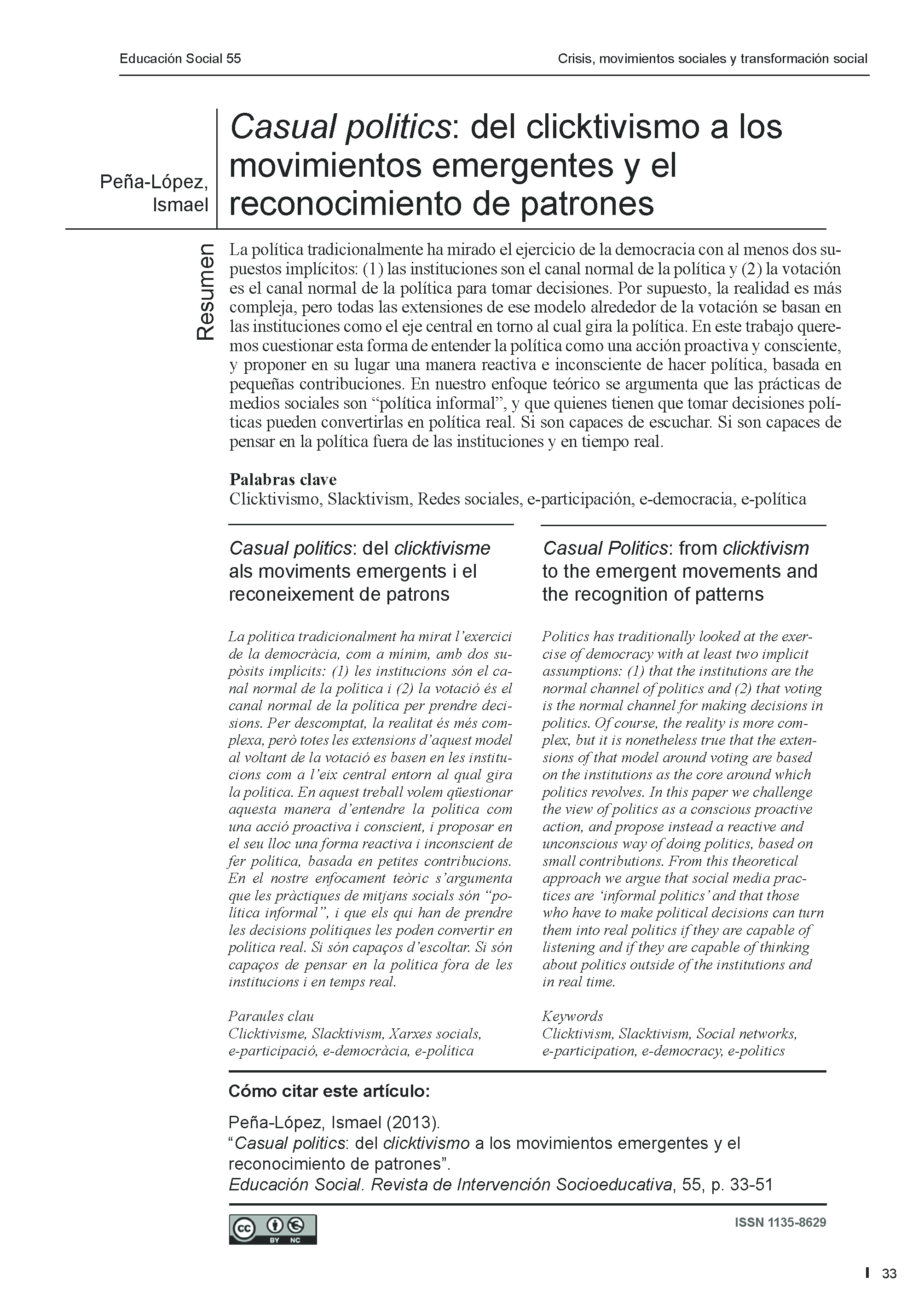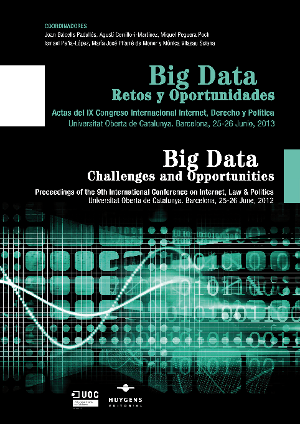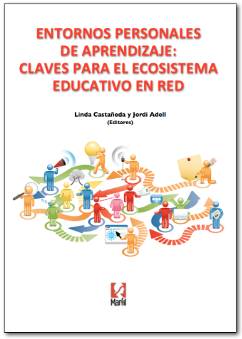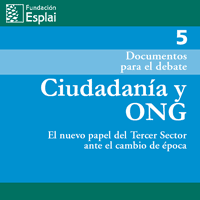20140101
By Ismael Peña-López
Main categories: News
Other tags: fundacio_jaume_bofill | open_innovation
No Comments »
Imagine an organization you highly and very sincerely respect. Imagine this organization calls you and tells you about their vision and the plans to achieve this vision. Plans about opening research, about making the creation and spread of knowledge very participative and collaborative, about making impact the target and research the instrument put at the service of that impact (instead of research being the goal and impact a casual side-effect). Imagine this organization asking for your opinion and listening to you digress about e-research, personal learning environments, the personal research portal, knowledge management or new ways to use technology and participate in the Information Society.
This happened in September at Fundació Jaume Bofill, a leading non-profit in Catalonia that performs quality research in human sciences in general, and now narrowing its field of action to Education in a very broad sense, with a special focus on inequalities, innovation and social change. And the conversation ended with a would you like to lead the project?
.
Since November 1st I am the director of open innovation at Fundació Jaume Bofill, being my general goal to rethink how knowledge is produced and shared all across the organization. To be able to perform my new responsibilities, since January 1st 2014 until February 1st 2015 I will be on partial leave from my current job, full time professor at the Open University of Catalonia. I describe what I think the main background is in Open Social Innovation. On the other hand, what I believe my main guiding lines will be in the following year was presented in December to my new colleagues. What follows are the slides I used (in Catalan):
All of this has mostly been learning by doing, so I just expect my experience not to be too much wrong.
There is a positive side-effect to this already thrilling collaboration. My University and I found that the best way to channel it was through the recently created Open Evidence, a spin-off from my University working in the field of social sciences research, innovation and knowledge transfer. I will thus be working side by side as a researcher and analyst with my friends Francisco Lupiáñez- Villanueva and David Osimo, whom I highly respect. I hope being closer will make it easier to produce some good things together.
Last, but not least, it is worth acknowledging that things do not happen just because. There is plenty of people to be grateful to. First of all, my thanks go to Ismael Palacín (director of the Foundation), Mònica Nadal (director of prospective) and the board of trustees of the Fundació Jaume Bofill (Carles Capdevila among others) for their trust in me; to some friends and “usual suspects” (Jaume Albaigès, Pau Vidal, etc.) for their priceless help and speaking well of me and my work; to Paco Lupiáñez, Agustí Cerrillo, Mireia Riera, José Miguel de la Dehesa and Enric Vinaixa for their support and making things happen; and to María Salido, Amalio Rey, Julen Iturbe and Ana Rodera for their “notes” on how to leave the nest. And, of course, to Mercè, Muriel and (soon) Jofre for their patience.
At this moment I’m both excited and terrified at the perspective of the new year. The project is huge, both a tremendous opportunity of making great things or falling into deep failures. The team I will be working with is gorgeous and an incredible source of learning. The gods be good to us! Come, masters, let’s home. I ever said we were i’ the wrong if we never tried.
20131227
By Ismael Peña-López
Main categories: e-Government, e-Administration, Politics, News, Participation, Engagement, Use, Activism, Writings
Other tags: 15m | slacktivism | technopolitics
No Comments »
My research on slacktivism has finally been published as a paper both in Spanish and Catalan at two “brother” journals: Educación Social. Revista de Intervención Socioeducativa and Educació Social. Revista d’Intervenció Sòcioeducativa.
This is work that I had already presented at two conferences — 9th International Conference on Internet, Law & Politics; II Jornadas españolas de ciberpolítica — and, thus, is now available in three languages: the former two plus English.
What follows — after the abstract — is a list of the references and full text downloads for the papers. The main idea of the papers is that if we look at slacktivism from the point of view of the “activist”, it is but true that it is a very low-commitment activism. But if we take the approach of the politician or the policy-maker, or if we take some distance and take a look at the whole landscape, what we find is that slacktivism is only a tiny portion of a huge cosmos of people very actively engaging in politics, extra-representational politics though, and that is why most of it flies underneath the traditional political radar.
Abstract
Politics have traditionally looked at the exercise of democracy with at least two implicit assumptions: (1) institutions are the normal channel of politics and (2) voting is the normal channel for politics to make decisions. Of course, reality is much more complex than that, but, on the one hand, all the extensions of that model beyond or around voting –issues related to access to public information, to deliberation and argumentation, to negotiation and opinion shaping, or related to accountability are based on institutions as the core axis around which politics spin. On the other hand, the existence and analysis of extra-institutional political participation –awareness raising, lobbying, citizen movements, protests and demonstrations– have also most of the times been put in relationship with affecting the final outcomes of institutional participation and decision-making, especially in affecting voting.
Inspired in the concept of «feet voting» (developed by Tiebout, Friedman and others) in this paper we want to challenge this way of understanding politics as a proactive and conscious action, and propose instead a reactive and unconscious way of doing politics, based on small, casual contributions and its posterior analysis by means of big data, emergence analysis and pattern recognition.
In our theoretical approach –illustrated with real examples in and out of the field of politics– we will argue that social media practices like tweeting, liking and sharing on Facebook or Google+, blogging, commenting on social networking sites, tagging, hashtagging and geotagging are not what has been pejoratively labelled as «slacktivism» (a comfortable, low commitment and feel-good way of activism) but «casual politics», that is, the same kind of politics that happen informally in the offline world. The difference being that, for the first time, policy- and decision-makers can leverage and turn into real politics. If they are able to listen. If they are able to think about politics out of institutions and in real-time.
Download
20131010
By Ismael Peña-López
Main categories: Cyberlaw, governance, rights, Meetings, News, Participation, Engagement, Use, Activism, Writings
Other tags: 15m | adria_rodriguez | arnau_monterde
No Comments »
During the year 2012, the research programme on Communication and Civil Society of the Internet Interdisciplinary Institute carried on a series of research seminars on Internet, net neutrality, hacker ethics and digital culture and on Internet, institutional crisis and new institutionalism — the later, coordinated by myself.
The result of that work is the recently issued working paper La reinvención de la democracia en la sociedad-red [The reinvention of democracy in the network society], coordinated by Arnau Monterde Mateo, Adrià Rodríguez and myself, and which has been published in Spanish.
I want to very sincerely thank Arnau Monterde for the opportunity he gave to me to take part and coordinate one of the seminars, and acknowledge the huge amount of work that Arnau Rodríguez devoted in putting all the pieces together. On the other hand, the final paper would not have been possible without the contributions of the participants that attended the seminars. In no particular order, and besides Arnau, Adrià and I, those were Pablo Aragón, Cristina Cullell, Débora Lanzeni, Carlos Sánchez Almeida, Javier Toret, Gala Pin, Carlos Tomás Moro, Joan Coscubiela, Gemma Galdón, Tomás Herreros, Rommy Morales, Pedro Miguel Da Palma Santos, Joan Subirats and Alicia Domínguez. A warm thank you to all of them.
Abstract
From the Arab Spring, through movement occupywallstreet or 15M it has been opened a new cycle of political network movements which propose many new elements regarding the political use of new technologies and the Internet to collective action. These new movements see the network not only as a tool or battlefield, but also as an organizational form, establishing a relationship that commonly has been linked to ethics and ways to do of hacker communities.
Moreover, the financial crisis in Europe is deepening blocking political institutions that have been building since the beginning of modernity. This crisis is expressed not only in the inability of these institutions to tackle the current economic, social and political, but also in its complicity with the mechanisms of financial dispossession. Such institutional crisis determines the need to exercise both a critical and process of invention and construction work that starts from the new technological possibilities and lessons of network movements, hacker culture and free software, which enable reinventing institutional and constitutional forms, and therefore also of democracy itself.
Download
20130627
By Ismael Peña-López
Main categories: Cyberlaw, governance, rights, e-Government, e-Administration, Politics, Information Society, Meetings, News, Participation, Engagement, Use, Activism
Other tags: idp | idp2013
No Comments »
The proceedings of the 9th International Conference on Internet, Law & Politics (IDP 2013): Challenges and Opportunities of Online Entertainment are already available for download.
Content, besides some minor editing, has followed the originals, so the reader will find articles both in Spanish or English.
To cite this work we suggest using any of the following references:
Balcells, J., Cerrillo i Martínez, A., Peguera, M., Peña-López, I., Pifarré de Moner, M.J., & Vilasau Solana, M. (coords.) (2012). Big Data. Retos y Oportunidades. Actas del IX Congreso Internacional, Internet, Derecho y Política. Universitat Oberta de Catalunya, Barcelona 25-26 Junio, 2013. Barcelona: UOC-Huygens Editorial.
Balcells, J., Cerrillo i Martínez, A., Peguera, M., Peña-López, I., Pifarré de Moner, M.J., & Vilasau Solana, M. (coords.) (2012). Big Data. Challenges and Opportunities. Proceedings of the 9th International Conference on Internet, Law & Politics. Universitat Oberta de Catalunya, Barcelona 25-26 June, 2012. Barcelona: UOC-Huygens Editorial.
Balcells, J., Cerrillo i Martínez, A., Peguera, M., Peña-López, I., Pifarré de Moner, M.J., & Vilasau Solana, M. (coords.) (2012). Big Data. Retos y Oportunidades. Actas del IX Congreso Internacional, Internet, Derecho y Política. Universitat Oberta de Catalunya, Barcelona 25-26 Junio, 2013. Barcelona: UOC-Huygens Editorial.
9th Internet, Law and Politics Conference (2013)
20130420
By Ismael Peña-López
Main categories: Education & e-Learning, News, Writings
Other tags: jordi_adell | linda_castañeda | ple | translearning
1 Comment »
Professors Linda Castañeda and Jordi Adell have just published the book Entornos personales de aprendizaje: claves para el ecosistema educativo en red (Personal Learning Environments: keys for the networked educational ecosystem), the most comprehensive work to date on Personal Learning Environments in Spanish language and, arguably, one of the most comprehensive too in any language.
This book is a tremendous (and, in my acknowledgedly biased opinion, succeeded) effort to produce a definition, a compilation of research approaches (pedagogical, technological, sociological…), framework of application and applied examples of what we understand by personal learning environments or PLEs.
The editors of the book asked me to contribute with a chapter — The research-teaching PLE: learning as teaching — which aimed at reflecting the use of the PLE in the intersection of research and teaching. In other words, how most scholars and teachers of all kinds could understand the PLE (a) beyond a tool for their students (i.e. for themselves), and (b) beyond the classroom. If I was to summarize my chapter in just one short sentence I’d say that the PLE becomes meaningful for the teacher when we understand the teacher as a learner too.
Part of the content of my chapter overlaps with what I dealt with in Heavy switchers in translearning: From formal teaching to ubiquitous learning. But, as I have pointed at, the book chapter (which was written first) has a more practical, hands-on, do-it-yourself approach, while the article definitely has a more academic flavour. And, of course, the former is in Spanish and the later in English.
The presentation of the book is terrific with a very cool website. Besides the printed edition, the book can be downloaded (as a whole, by sections and by chapters) and can be reused thanks to its BY-NC-ND 3.0 Creative Commons license.
My gratitude to Linda and Jordi goes “beyond usual” as they really encouraged me in putting together all my stuff on this topic, which ended up in the chapter and the aforementioned article. Many thanks for that!
Downloads
20130417
By Ismael Peña-López
Main categories: News, Nonprofits, Writings
Other tags: heavy_switching | John_Moravec | on_the_horizon | ple | translearning
No Comments »
After a long collaborative process of several months, the book Ciudadania y ONG (Citizenry and Nonprofits) has just seen the light. This has been a very interesting exercise of co-coordination along with Imanol Zubero, Carlos Giménez and Enrique Arnanz.
For the making of the book, the website CiudadaniayONG.org was used in two steps:
- A delimited survey open to everyone, to copse the main topics around the three axes that we had predefined:
intergenerational relationships, transforming participation, and digital citizenry.
- An open forum, where the main conclusions of the survey were discussed and complemented with many insights.
In each step documents were produced to provide the appropriate context for the coming reflection.
Besides being part of the whole process, I concentrated in the third axis, that is, digital citizenry, and what did it mean for participation, volunteering and nonprofits in general entering the new era of the Information Society.
I am deeply grateful to the promoters of the book, Fundación Esplai, and, of course, to the rest of the coordinators. Scholars have fewer occasions to collaborate with people outside the Academia and higher pressure not to: being part of the book was keeping a wire attached to the power that boosts citizen movements. Besides the later, some of the many people that helped in making the book a reality are Carles Barba, María Jesús, José Maria Pérez, Maria Jesús Manovel, Elvira Aliaga, Virginia Pareja, Cesk Gasulla, Josechu Ferreras, Jorge Hermida, Carles Campuzano, Luis M. López Aranguren, Consuelo Crespo and Rafael Rodríguez.
The book has been published in Spanish and translated into Catalan.
Downloads:






